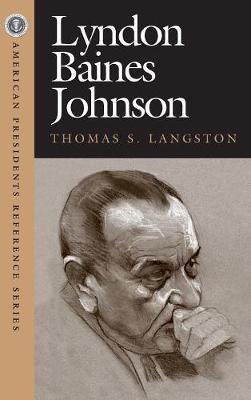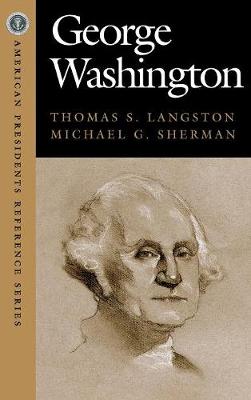American Pres Reference
2 total works
Each volume in the American Presidents Reference Series is organized around an individual presidency and gathers a host of biographical, analytical, and primary source historical material that will analyze the presidency and bring the president, his administration, and his times to life. The series focuses on key moments in U.S. political history as seen through the eyes of the most influential presidents to take the oath of office. Unique headnotes provide the context to data, tables and excerpted primary source documents.
Lyndon Baines Johnson was born in 1908. He was first elected to Congress in 1937 and reelected twice. When he set his sights on the U.S. Senate in 1940 he was defeated. Following the Japanese attack on Pearl Harbor, Johnson was the first member of the House to volunteer for active military duty. In 1949 he became a U.S. Senator and was elected its majority leader in 1955. Johnson sought the Democratic presidential nomination in 1960, but lost to John F. Kennedy, who would offer him the vice president spot. In a close election, the Kennedy/Johnson ticket prevailed over Nixon/Lodge.
In 1963 Vice President Johnson was part of the motorcade traveling through Dallas, Texas when Lee Harvey Oswald assassinated Kennedy. Johnson, while aboard Air Force One, was sworn in as 36th president of the United States. His administration crafted and oversaw several great moments in American history, including civil rights efforts, the Great Society, and technological advances. These events were, to some degree, overshadowed by the poor economy, civil unrest, and the U.S involvement in the Vietnam War. Troubled by his rapidly declining public approval, he did not seek re-election.
This new volume on the presidency of Lyndon Baines Johnson will cover:
- His political skills
- Replacing JFK
- The Vietnam War
- The Economy
- The Great Society
- Civil Rights
- Technology and Space
Each volume in the new American Presidents Reference Series is organized around an individual presidency and gathers a host of biographical, analytical, and primary source historical material that will analyze the presidency and bring the president, his administration, and his times to life. The series focuses on key moments in U.S. political history as seen through the eyes of the most influential presidents to take the oath of office. Unique headnotes provide the context to data, tables and excerpted primary source documents.
George Washington, born in 1732, was the first president under the Constitution of the United States. In 1753 he began his military career as a major in the Virginia militia. In 1755 he was appointed aide-de-camp to Major General Edward Braddock, under whom he fought in the French and Indian War. Three years later Washington resigned his post to seek election to the Virginia House of Burgesses, where he served for nine years. He was also a Virginia delegate to the First Continental Convention. On June 16, 1775, Washington accepted a commission as the commanding general of the Continental army. His skills as a multifaceted leader military, political, inspirational eventually led to the British defeat, the signing of the Treaty of Paris in September 1783, and Washington′s retirement. However, in 1787 he agreed to serve as a delegate to the constitutional convention. Presidential electors unanimously elected Washington president in 1789.
Key events during his two terms of office were the enactment of the Bill of Rights, Washington′s commitment to neutrality in his foreign policies, and the ongoing debate about the role of the national government as championed by ardent opponents in Washington′s administration: the Democratic-Republican Secretary of State Thomas Jefferson and the Federalist Secretary of the Treasury Alexander Hamilton. Washington established the tradition of the two-term presidency when he retired. George Washington died on December 14, 1799.
This new volume of the presidency of George Washington will cover:
- His military exploits before, during, and after the American Revolution,
- His inspirational role during the constitutional convention,
- The Jeffersonian and Hamiltonian political perspectives,
- Foreign affairs, American neutrality, and the Jay Treaty of 1795,
- Washington′s legacy on American democracy.

